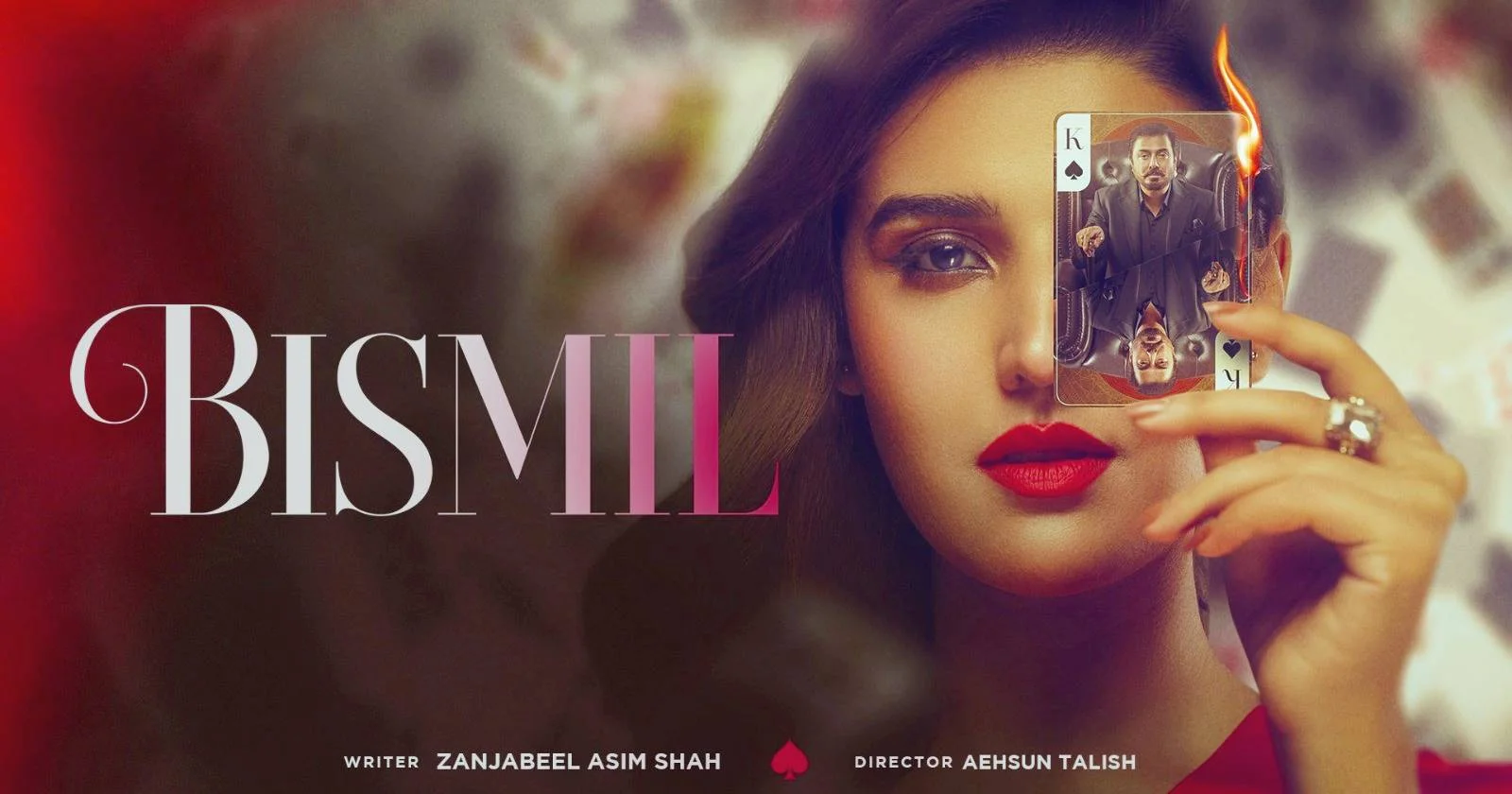

If you are watching the drama, Bismil, I’m sure you have been conflicted from its start to the point it has brought us now. This show started with much criticism from viewers about this story not being based in reality since the man was happy with his wife and loved his son. They argued that it’s not that easy for another woman to come into such a tightly bonded family and tear it apart in such a way.
Many other valid reasons took the audience a while to understand this show. I probably wouldn’t give this show a chance if it weren’t so real to me. There are so many production issues, starting with lighting. There is no distinction between indoor and outdoor lighting. We, as viewers, always feel like we are caught in a bright gulf of the burning sun. The ambiance must also change with changing surroundings and moods, which I’m sure includes lighting, but I’m no expert.
And the continuity errors. That little person inside my brain noticed every little thing and had extreme difficulty with it. She saw the lipstick color changing from nothing to dark pink within seconds. Or the handbag on the shoulder that disappears halfway through the entrance. The little person in my brain cannot let those things go. She not only rejects them, but she also keeps poking me right above my eye, asking me to unsee them, and we all know that I cannot.
The editing team, the last line of defense, could have fixed many of these mistakes. Even though all of these issues made it into the show, it seems Bismil is still redeemable and can stand on its two feet. The show’s saving grace is the writer’s ability to tell a story that hits the heartstrings. It is not just drama and a nicely written story but reality for many of us. One act that is “not haram” and someone’s God-given right can destroy so many lives.
Understanding that permission given by Allah doesn’t absolve one of all responsibility for feelings and care for others who matter. Why does selfishness become a prerequisite for a second marriage? That’s an open-ended question for all men. Feel free to reply. I’m all ears.
The actors are also heavily responsible for making this drama worth watching and understanding what goes through the hearts and minds of all those involved in these situations. Nauman Ijaz has never disappointed; this time, he has blown me away. I have seen my father say those exact words to us and our mom. I have watched him be helpless in love with a woman who he, on some level, understands is ruining his life and destroying his family. He always thought his first wife and children would understand; they loved him unconditionally. They won’t leave him. This new woman, that kind of attention and love (real or not) can disappear.
Masooma did not miss a beat in how she played the other woman. I know women like her. The woman my father married was also much younger and came from a humble background. She was a nurse’s aide while my father owned the whole business with five branches in the city. How she managed to get close to him and made him feel she was worth his time and attention. How does a well-respected American board-certified doctor devoted to his family fall for the tricks of an uneducated young girl? I refer you to the drama Bismil for a full tutorial. That is how you land yourself a wealthy married man.
Reham’s character was also superbly played. When another woman starts to pay attention to things men believe their wife doesn’t care about, they completely forget everything the wife has done for them. Reham played the dotting wife and a concerned mother with perfection. We asked our mother to get a divorce on many occasions after his second and third marriages. She used to say, “If I leave him, you will be cut off from him.” I realized as I got older that she was the glue to our relationship with our father. Because they were married, he was able to attend family events. He used to come and stay; he met his grandchildren, and they spent time with us as a family. Had she not made this effort, we would have lost touch with him because we would have never wanted to spend time with his wife, and she would not want to have us over at every event and function.
Many people still wonder why Reham, who seems like a strong woman, comes from a strong background, and seems to have enough money to get her son married, is choosing to put up with his horrible behavior. Leaving was her first instinct. She eventually put her son and his happiness before her feelings. She knew that her son wanted his father in his life. She understood that the world would only respect her and her son if a rich father stood beside them.
My mind goes to the scene when Reham stands in front of TT with her hands bonded, asking him to come to his son’s wedding, and he refuses. I remember my mom insisted that my wedding would take place at my dad’s place, which meant I would have to go and stay at his house where his other wife lived. My mom still insisted, even though I was against it. She said it’s essential that your in-laws get you from your father’s house. I couldn’t give that to my other daughters, but I can do this now, so I will. I didn’t understand its importance at that time. But I do now. My father couldn’t attend my sister’s wedding because he was busy with his weddings both times. Valid reason, who leaves his wedding for his daughters’. Right?
There are so many scenes that are like De Ja Vu. Such as when TT fires a loyal employee. Also, when he tells his son that he is nothing without him “tum ho kaun?”. I couldn’t help but smile. I said a prayer for my father. That was my father’s spirit right there. He had the money, the young new wife, and the control; he didn’t need some kid who depended on him to question him. Nauman Ijaz did it justice. Very few actors can capture that kind of confidence and grandeur in such a short scene.
I can’t count the number of times I have been told that it is HIS money and HIS business, and I had no right. How many doors have been locked on us, and how many places we have been told to leave that once belonged to us? It’s telling how what seems overly dramatic and unreal to some feels right at home to others.
May Allah forgive my father and grant him peace in his eternal life. He suffered much from medical issues towards the end of his life, and he also had the realization that he trusted the wrong people. Mainly because when he became extremely ill and bedridden towards the end of his life, we took care of him. His other family is still busy spending the money our parents spent their lives making. That was a huge eye-opener for him.
I saw my father go through every one of those emotions we know the father in this show is facing. I saw him suffer; I saw him lose every single penny of his hard-earned money because his younger sons took it from him. I saw him physically suffer because his sons wouldn’t take him to the doctor. I saw his wife not worry about feeding him a proper diet when he couldn’t chew his food.
He admitted that trusting his sons (our half-brothers over us) had been a mistake. That is how the story ends—full circle. You have to lose everything before you see what you have. In Bismil, this man lost almost everything to realize what he had. People like Masooma and those associated with her will be unaffected because they are irredeemable. They will move on to the next if it’s not one person for them. They have sold their souls for money.
In our real story, our father lost everything right before his death. My half-brothers made our father sign over his business and even his accounts to them. Our father had to ask us to take him to appointments and pay for his needs. Finally, we just completely took over his care until his death. Now, they own everything he had; we never received anything from him in his life, and they never showed his will after his death. She married him for his money, which she worked hard for; her mission is successfully complete.
But it’s not about money. We are all successful. All of us siblings love each other. We have a large circle of family and friends who care about us. Our children and their children are happy, healthy, and successful. We have more than we could ask for or need. While I may not forget what that woman and my half-brothers did, I am not vengeful. We get what Allah has written for us. Taking what belongs to others will always be the downfall. So, they lose, we win.
In Conclusion, watch Bismil. I recommend it.


All Rights Reserved © 2025 Femmerepublica. Powered by TechWrath